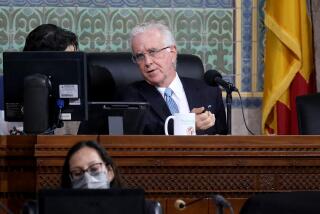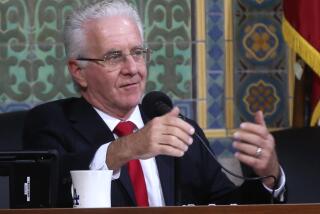L.A. City Council clarifies voting rule for neighborhood council races
The Los Angeles City Council agreed Wednesday to tighten the rules for who can vote in neighborhood council elections after complaints that an overly broad definition of community stakeholder had allowed outsiders to manipulate results.
The new rules mark an ongoing attempt to refine the neighborhood governance system, struck in the late 1990s after the San Fernando Valley secession movement to give residents a stronger voice in city politics.
Previously, anyone could vote in a neighborhood council race just by displaying a receipt for a latte from around the corner, as proof of having a vested interest in a community — a “Starbucks stakeholder.”
Now voters must either work, live, own property or show membership in a community organization within council boundaries. The new language changes the voter definition from someone who “owns property” to someone who “owns real property.”
About 100 neighborhood councils advise the City Council on issues affecting their communities. A decade ago, the formation of the groups was an attempt to give residents, especially those in the San Fernando Valley, a voice beyond their elected representatives at City Hall.
At the meeting Wednesday, a few members of neighborhood councils voiced opposition to the ordinance, saying that while they generally support it, it would complicate their upcoming elections in March.
“We don’t know how this is going to affect our bylaws,” said Gary Aggas, president of the Sun Valley neighborhood council. “I don’t want to confuse my stakeholders.”
The filing period for Sun Valley’s election opens next week. Council members acknowledged that changing the definition could affect the elections, but the ordinance passed unanimously. The change goes into effect in 30 days.
“This is a step we’ve needed to take for a very long time,” said Councilman Paul Krekorian, who called the loose definition a “fundamental problem” with neighborhood councils.
Last year a neighborhood council election in Eagle Rock turned ugly when some claimed the results had been swayed by people showing up with a receipt for gas or a coffee purchased in the neighborhood as proof that they could vote in the election.
Soon after, Councilman Jose Huizar, who represents that community, proposed changes to the definition.
“We are putting an end to the Starbucks stakeholder,” he said at Wednesday’s meeting.
Raphael Sonenshein, executive director of the Pat Brown Institute of Public Affairs at Cal State Los Angeles and the city charter reform commission that created neighborhood councils, said the definition of who can participate has been one of the toughest questions the system has addressed.
He said people had worried that limiting who could vote might take away from the council’s overall goal of expanding participation. But he thinks the new definition of “a person who affirms a substantial and ongoing participation” in the community should eliminate the Starbucks stakeholder problem.
The city’s Neighborhood Council Election guidelines now also include this ban: “Receipts from businesses in the neighborhood will not be accepted.”
Still, the new ordinance won’t be problem-free.
“The system’s improving,” Sonenshein said, “but what it doesn’t do and couldn’t do — there’s no way to do it — is provide an answer for what a stakeholder is that’s so clear that it will brook no contradiction.”
Michael Nogueira, current president of Eagle Rock’s Neighborhood Council, said he’s thrilled about the ordinance. When he was elected last year, he said he was shocked to see people driving from as far away as Lancaster, Bakersfield and Long Beach to vote.
“I couldn’t tell you how to vote in Long Beach because I don’t live there and I don’t have any say-so, and shouldn’t,” Nogueira said. The neighborhood councils are intended to provide City Council members with the perspective of people who spend time in those communities, he said, so voters in the elections should have to really be part of their community.
soumya.karlamangla@latimes.com
More to Read
Sign up for Essential California
The most important California stories and recommendations in your inbox every morning.
You may occasionally receive promotional content from the Los Angeles Times.











